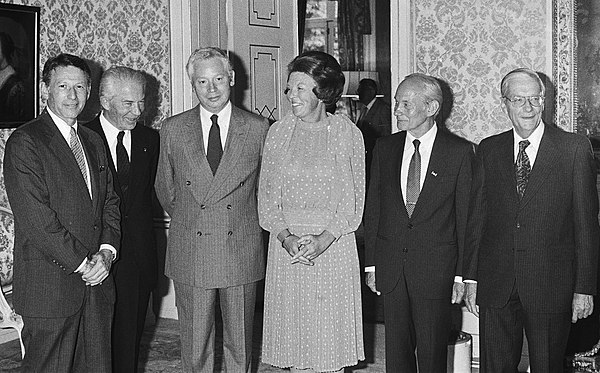by SUBODH VARMAL
 Queen Beatrix of the Netherlands meets Nobel laureates in 1983. Weinberg is on the queen’s right PHOTO/Wikipedia
Queen Beatrix of the Netherlands meets Nobel laureates in 1983. Weinberg is on the queen’s right PHOTO/Wikipedia
Nobel-winning physicist Steven Weinberg is often called one of the most influential living scientists in the world. Besides his seminal work on particle physics and several other books on science, the 82-year-old American has just come out with an account of the birth of modern science titled ‘To Explain the World’. He talks to Subodh Varma about the tension that exists between religious belief and science:
Many people believe that much of modern science already exists in ancient texts or teachings of their respective religions. In India, for example, the Hindu rightwing claims that many scientific and technological achievements of modern times like the aircraft, nuclear bombs, plastic surgery, etc were discovered 3,000 to 10,000 years ago. Is that possible?
It is nonsense to suppose that modern scientific and technological knowledge was already in the hands of people thousands of years ago. Though much has been lost, we have enough ancient texts from Greece, Babylon, India, etc to show not only that early philosophers did not know these things, but that they had no opportunity to learn them.
What is the difference in the ‘science’ of ancient times and modern times?
We have learned to keep questioning past ideas, formulate general principles on the basis of observation and experiment, and then to test these principles by further observation and experiment. In this way, modern physical science (and to an increasing extent, biological science as well) has been able to find mathematical laws of great generality and predictive power. Our predecessors in the ancient and medieval world often believed that scientific knowledge could be obtained by pure reason, and where they understood the importance of observation, it was passive, not the active manipulation of nature that is characteristic of modern experiment.
Further, their theories of the physical world were often muddled with human values or religious belief, which have been expunged from modern physical science.
Why did modern science arise in the 17th century? Why not earlier or later?
It is impossible to say why the scientific revolution occurred precisely when and where it did. Still, we can point to several developments in former centuries that prepared the ground for the scientific revolution.
One was the Renaissance of the 15th and 16th centuries, which led to an increased concern with the real world and a turning away from scholastic theology. Another was the invention of printing with moveable type, which made it possible for the books of scientists such as Copernicus and Galileo to circulate rapidly throughout Europe.
Looking further back, we can point to the growth of universities from the 13th century onward. Although these grew out of schools associated with Christian cathedrals, they became havens for secular scientific research, for Buridan and Oresme at Paris, for Galileo at Padua and Pisa, and for Newton at Cambridge.
Despite stupendous advances in science, its acceptance still seems to be limited in society. In fact, you have publicly taken on antiscience lobbyists like climate change deniers or anti-evolutionists…
There are few people today who will deny the value of science, but there are many who are terribly confused about the content of scientific knowledge.
The Times of India for more
